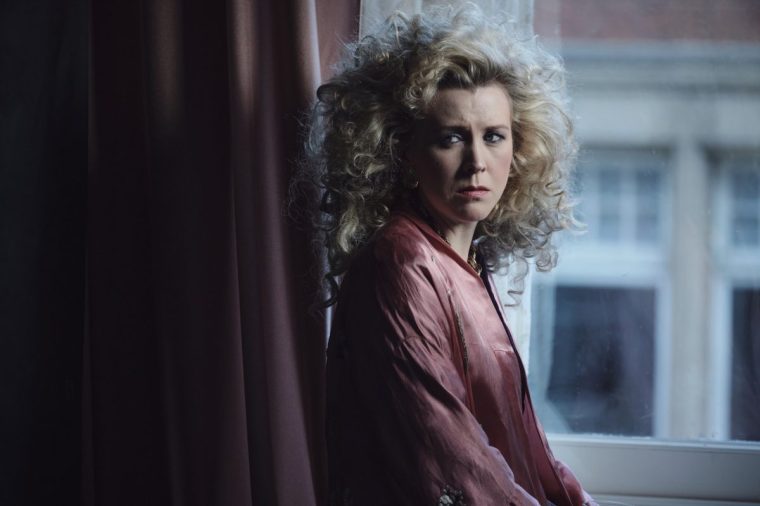Timestalker is not your average time travel film. Forget classics like The Terminator or About Time, because director and writer Alice Lowe breaks all the rules. Starring as its lead, Agnes, Lowe plays a woman destined to chase the unenthusiastic object of her affection, Alex (Aneurin Barnard), through time.
There’s no obvious cause for the time-hopping and it’s not really time travel in the traditional sense – with a dominant time period or clear narrative drive. Agnes simply wakes as herself in different historical eras, all the way from the Middle Ages to the 80s, increasingly haunted by flashbacks of meeting Alex before.
If you’ve come across Lowe before – either in her collaborations with Brit indie filmmaker Ben Wheatley or in her directorial debut, Prevenge (2016) – the anarchic mother horror where she stars as a mother-to-be (she was pregnant herself during filming) commanded to kill by her unborn foetus – you may have preconceptions of her work as comically gruesome. Timestalker is technically no less bloody or comic, but its tone is starkly different, fuelled more by yearning than fury, more by hope than despair.

Agnes meets Alex first in 1688 when she is a Scottish spinster, and he is about to be executed for some undefined religious heresy. She saves his life and, in turn, loses her own (axe straight to the forehead – I told you it was bloody). It’s a pattern that repeats. She meets him again in 1793: Agnes a bored aristocrat with a mad pink Marie Antoinette-esque wig, keen to escape the nightly visits of her grotesque husband George (Nick Frost), and Alex a handsome, fame-hungry highwayman. Then again in the 1980s, when he’s an incompetent, egotistical rock star, and she a crazed fan. We pop into the 1800s and 1940s briefly, too – and always there are lush, over-the-top sets, savage deaths, and unrequited love.
If it sounds bonkers, that’s because it is. But not in a wayward way. It is richly textured and transporting, yet Lowe keeps a firm grip on her story, with edits as brutal as the various decapitations. In 1980, one of the eras Lowe devotes a significant amount of time to, we cut suddenly from scenes of Agnes in a leotard struggling with aerobics, to flashbacks of chasing Alex through woods centuries before. The film feels briskly paced for a wacky narrative that might otherwise come across as self-indulgent. It is never superfluously dreamy; at 90 minutes it is slim, never a second wasted.
As the flashbacks increase, Agnes starts to remember: this has all happened before. Always, she begins to realise, she is doing the chasing. Why? Is it a dream? A memory? People tell her she has a mental health issue, but perhaps history is teaching her something about love, about fixating on something external when the key is inside yourself. And the more things change the more they also stay the same, not just for Agnes but for her co-travellers, too: Tanya Reynolds (Sex Education) as her maid/confidante, Jacob Anderson as Scorpio, a cryptic bystander who may be friend or foe. Can anyone escape destiny’s cruel loops?
It is, like her other films, extremely funny: Lowe’s humour is of the off-kilter Monty Python variety. (There are silly jokes about fish wives at executions, and an absurd medical treatment of syphilis involving improbably jolly doctors and pink steam.) But above all, this film ripples with emotion. It is suffused with a sense of longing that lodges deep in its audience, even if we don’t always fully understand it. What do we want and how do we get it? Like the tarot cards Agnes takes to consulting, the answer may indeed lie in death – but perhaps not the literal kind.


